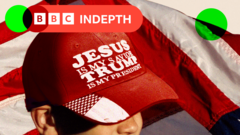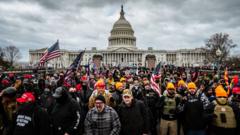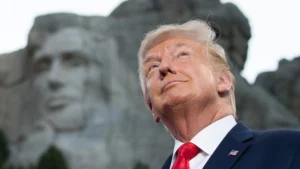As Donald Trump campaigns for a second term, many evangelical Christians perceive him as a savior sent by God, despite controversies surrounding his personal character. This article examines the motivations behind their support, contrasting it with voices of dissent within the Christian community, and reflects on the changing landscape of faith in America.
Belief and Politics: The Evangelical Support for Trump in a Changing America

Belief and Politics: The Evangelical Support for Trump in a Changing America
A deep dive into the intricate relationship between Donald Trump and his evangelical supporters, exploring their perception of him as a divinely chosen leader amid declining church attendance in the United States.
Standing before a crowd in a Florida convention center, Donald Trump stated, “Many people have told me that God spared my life for a reason, and that reason was to save our country and to restore America to greatness.” This assertion, which forms the bedrock of his campaign, resonates particularly with his evangelical supporters, many of whom view him as divinely anointed—a notion that has gained traction particularly after an attempted assassination on him in July.
Television evangelist Hank Kunneman framed Trump’s leadership as a part of a grand spiritual battle, echoing sentiments shared by his supporters who, in the months preceding the election, likened Trump to Biblical figures like Moses. Jim Caviezel, recognized for his role as Jesus in "The Passion of the Christ," humorously labeled Trump as the “new Moses,” signaling the deeply religious undertones that many discern in his candidacy.
Reverend Franklin Graham, son of iconic preacher Billy Graham, firmly believes that Trump was chosen by God, citing the miraculous circumstances surrounding his attempted shooting. Graham argues that the character questions surrounding Trump—accusations of sexual misconduct and other controversies—should not overshadow his actions, particularly his commitment to appointing anti-abortion judges during his first term.
Trump's strong evangelical support, however, exists within a broader context marked by declining church attendance in the U.S. Pew Research data indicates a drop from 90% of American adults identifying as Christians in the early 1990s to 64% today. Robert Jones, founder of the Public Religion Research Institute (PRRI), suggests that Trump has capitalized on this decline by promising to restore power and influence to the Christian community.
Nevertheless, not all Christians align with Trump's vision. Reverend Monte Norwood of Bible Ways Ministries in Atlanta articulates a contrasting Christian perspective, condemning Trump's behavior and rhetoric. Norwood advocates for a faith rooted in compassion for the marginalized, opposing what he sees as the hypocrisy of white conservative evangelicalism.
PRRI research delineates voting trends among religious groups; white evangelicals continue to predominantly support Republican candidates while minorities, particularly black Protestants, overwhelmingly lean Democratic. This persistent trend highlights the ideological divide within American Christianity and raises questions about electoral dynamics heading into the 2024 elections, especially in light of shifting demographics.
Amid these tensions, Trump’s campaign continues to appeal to a nostalgic vision of American Christianity. As demographic changes unfold and religious disaffiliations rise, the gulf grows between traditional practices and contemporary beliefs. Questions loom about how Trump's leadership might foster faith-based policies while also navigating the realities of a diversifying nation.
Amidst these discussions, Franklin Graham remains optimistic, asserting that despite the elections, legislative support for religious freedoms will endure. The broader implications of this political-religious alliance remain to be seen, as the American populace watches closely to witness how faith and politics intersect in the years ahead.





















